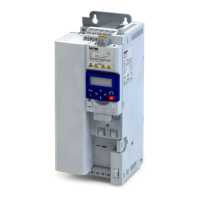Address Name / seng range / [default seng] Info
0x2B09:002
(P315.02)
Slip compensaon: Filter me
(Slip compens.: Filter me)
1 ... [100] ... 6000 ms
Filter me for the slip compensaon.
•
The preset lter me is adapted to typical motors.
0x2C02:004
(P351.04)
Slip frequency
(Slip frequency)
•
Read only: x.x Hz
Display of the rated slip determined.
10.4.6 Set oscillaon damping
The oscillaon damping serves to reduce the oscillaons during no-load operaon which are
caused by energy oscillang between the mechanical system (mass inera) and the electrical
system (DC bus). Furthermore, the oscillaon damping can also be used to compensate for
resonances.
The funcon is equally suitable for the closed loop V/f characterisc control.
Restricons
Observe the following restricons:
•
Damping is possible only for constant oscillaons at a steady-state operang point.
•
Oscillaons occurring sporadically cannot be damped.
•
Oscillaon damping is not suitable for oscillaons occurring during dynamic processes
(e.g. acceleraons or load changes).
•
Oscillaon damping is only acve if the setpoint speed is greater than 10 rpm and the DC-
bus voltage exceeds a value of 100 V.
Details
The determinaon of the oscillaon is based on the acve current. In order to obtain the
alternang component of the acve current, this current is dierenated. This signal is then
passed through a PT1 lter.
Idencaon of the oscillaon
Before the oscillaon damping funcon can be parameterised, the oscillaon has to be iden-
ed. One way to do this is to examine the motor current while oscillaon damping is switched
o (gain = 0 %). At steady-state operaon, a constant current ows. If the drive oscillates,
these oscillaons are also visible on the motor current. It is therefore possible to determine
the frequency and the amplitude of the oscillaon from the alternang component of the
motor current. In the following, this alternang component is referred to as "current oscilla-
on".
Parameter seng
Set the gain of the oscillaon signal according to the following equaon:
0x2B0A:001 (P318.01) = current amplitude * 100 % / (Ö
2
* maximum device current)
The default me constant of the PT1 lter is sucient for most applicaons. If required, it is
only possible to adapt the me constant via »EASY Starter«. Generally, the me constant must
be set so that the oscillaon is dampened and higher-frequency components are ltered from
the signal. The me constant is given by the reciprocal value of double the current oscillaon
frequency:
0x2B0A:002 (P318.02) = 1 / (2 * oscillaon frequency)
Parameter
Address Name / seng range / [default seng] Info
0x2B0A:001
(P318.01)
Gain
(Gain)
-400 ... [150] ... 400 %
Gain of the oscillaon signal.
•
With the seng 0, oscillaon damping is deacvated.
0x2B0A:002
(P318.02)
Filter me
(Filter me)
1 ... [30] ... 600 ms
Time constant of the PT1 lter.
Conguring the motor control
V/f characterisc control for asynchronous motor (VFC open loop)
Set oscillaon damping
184

